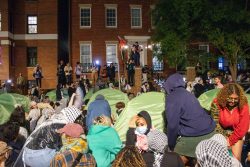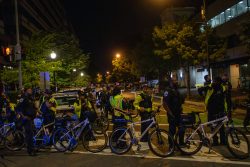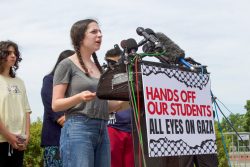It’s 8:15 on a Saturday morning and Kari Chong (MSB ‘09) finds herself at a bus stop. Two buses and a windy wait underneath a patriotic metro sign stand between Chong and her clients, who are rushing to claim and deduct before tax season ends.
Kari Chong is a tax preparer, but not the ordinary kind, and certainly without ordinary clients. She is now part of a District of Columbia program called Community Tax Aid, which provides free tax assistance to low-income D.C.-area families and individuals and operates at 13 area sites. Notified of the volunteer opportunity by an email from the MSB dean, Chong said she had been looking for a way to get involved.
Fledgling tax preparers
Chong has come to know these families in a peculiarly intimate way. Almost every Saturday morning during tax season, she pours over details of strangers’ private lives, details that they would hesitate to share with even their family and closest friends.
Chong said that she was initially surprised by the lack of social contact with clients.
“I was disappointed at first not to get to know the customers who come in better,” she said. “But then I realized that I was privileged, in a sense, because I am seeing them in a very different way. I see people I would otherwise not know through an intimate look at the parts of their life that we normally just don’t talk about,” Chong said.
Community Integration
Until her free pizza lunch every Saturday, Chong sits at a computer screen in a small office at CentroNía, a community organization in Columbia Heights, where she types in columns of numbers in an effort to get the best possible tax returns for her clients. These clients, according to site coordinator Wesley Walsman, make an average of $15,000 to $25,000 a year.
According to Walsman, clients must make $40,000 or less to qualify for help, though the service itself is completely free.
Not all immigrants at CentroNía are permanent residents or here on a visa; some of the clients are illegal aliens. Still, a number of undocumented immigrants choose to file and pay their taxes, explained Enrique Torrico, director of the center’s Family Institute.
The tax system is designed so that someone without a social security number can get an identification number to pay his or her taxes and sometimes claim child tax credit, if his or her child is American-born and has a social security number. Undocumented immigrants are not, however, allowed to claim earned income tax credit.
“Filing your taxes is seen increasingly in the community as more of a responsibility than a right. It allows immigrants—documented or not—to be part of a community where they see good things happening,” Torrico said.
Success in numbers
CentroNía boasts impressive statistics. In 2004, the small center, with only three office computers that print, helped file 199 tax returns and helped clients garner a grand total of $325,297 in refunds. About 80 percent of its clients are Hispanic and most discover the center’s tax services through word of mouth, Walman said.
The tax aid volunteers at CentroNía often act as liaisons between the low-to moderate-income area population and the various state and federal governments. Welsey and Enrique, both fluent Spanish speakers, serve at times as translators for clients as they oversee each step of the process, from Chong’s software work to site supervisor Parker’s final review of the tax forms and calculations.
Enrique explained that many times clients do not understand the technical jargon of tax preparation. Volunteers explain to them what different terms mean as well as how they can file their taxes in order to get the best returns possible.
Chong said their most important goal is to get the largest refunds possible for their clients.
“When you realize that these people are living from check to check, you see what a few hundred dollars can mean to them,” she said.
According to Torrico, most volunteers at the center are university students, though some are professionals who work nearby. In the past, professional tax preparers have also volunteered.
CentroNía, which is one of several locations, started with support from the Children’s Defense Fund, Torrico said.
Since its inception three years ago, CentroNía has helped more than 5,000 taxpayers receive over $4 million in refunds. As volunteer Coite Manuel said, “That’s a pretty good return. About $800 an hour, if you do the math.”




